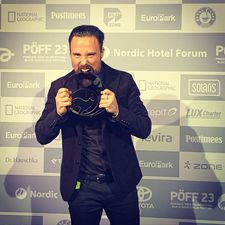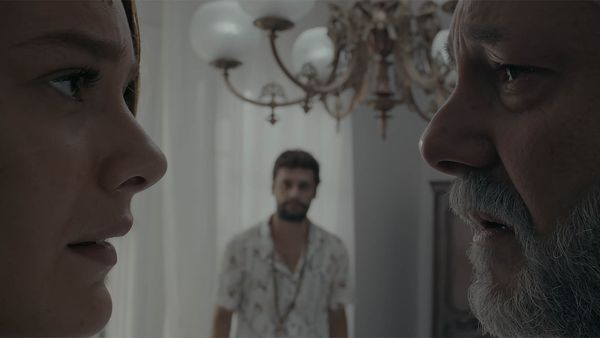How was it to move from acting to directing?
Well, I'm still an actor but it was fun because the structure is very close to theatre. Most of the time I had with the actors, which is something I love to do, I didn't really direct them because you can't. It's one take of one hour and 15 minutes in the middle of the film, so I kind of just lead them.
When you were originally writing it, was it always your intention to have the big single take in the centre?
Yes, because the idea was to expose things and not have the cinema tricks that comes with the editing. The actors bring a lot to the characters. My first idea was for them not to follow the script but just to follow the structure. But it didn't happen. They really followed the script because they didn't have time.
And when you're shooting a single take like that, at the heart of the film, is that something you have to massively plan with the cinematographer?
I should have. We didn't have much time. It was a very small budget film, so most of the time I actually had was with the actors. This was like ten days. We had the camera for the last three days, kind of staging them in the language of the film. But it was about bringing in theatre experience - and the actors were very experienced in theatre too so that was very helpful.
 |
| Bernardo Barreto with his Special Jury Prize. |
It changed a lot because we didn't have the location until a week before and the location wasn't what I imagined, so everything was very alive and I had to go with the flow.
How many times did you do the single take?
Four times. Actually, they all worked.
Which one did we use?
I think we used the second but it was really a struggle to pick one - some were better at different moments.
It must be quite a tough choice when it's such a long piece?
Some of the actors are my friends and, man, I know he's going to be really pissed off with me because I know his third take was the best. But I can't do anything about that, I'm working for the film.
How is casting something like that because it's so important - did you have people in mind for the roles?
Some of them are my friends. We cast it in December, which is really a holiday time in Brazil because that's our summer and it was really hard to find actors. Not a lot of actors wanted to work close to Christmas and that was the hard part. It's kind of like magic that everyone comes together and it happens.
At the moment there's a bit of a spotlight on Brazil politically speaking, were you conscious of that political backdrop as you were making the film?
So I had this script but it didn't have much of a political background at first, it was more criticism towards the family. Then, what was happening in Brazil really excited me to make this film - because everybody is pointing fingers at each other. The country's divided to the left and right and there's this massive aggression in social media and everywhere, even on the streets. So I thought, what about the corruption that lives inside of us. Are we really this kind of Brazilian people who will accept everything with no discrimination of any kind? No. There's a lot of families that I've seen and even my family structure, the film unfolds that. What is happening politically in Brazil is kind of a response to who we are.
Was it a steep learning curve with the direction? You've done TV directing before but I imagine this was more pressure.
Yes, pressure, but that was great because you learn so much from it. It was a very different structure because of the hour and 15 when I'm kind of leading the actors, while on TV I'm directing take to take. It was great to let it go and be out of control. A lot of this is to do with control. I mean, this political thing is like, 'If you think differently to what I do then you're wrong', pointing fingers. But directing this was very much the same exercise. I was, like, "Okay, man, just go".
The funny thing about this film - I call it a non-political because its all about love and acceptance in the end - but the whole thing that was happening in the country started happening in the crew. People were diverse in their opinions and having fights, although not big ones. I was like, "Whoa, this is a really specific energy and it's happening everywhere". It's like a cyclic movement in the world.
Is there pressure when you are an established actor, to be in the film?
Yes, sometimes. I wanted to play the lead role and rehearsed for three months in New York but in the end I thought, "He has to be really light" so I got someone else in. I have a very small cameo but it was really an accident because some guy didn't show up.
Is the film going to travel now?
We have some distribution in Europe and Brazil. You never know, because Brazil is going through a very dark period in terms of culture.
Does that worry you?
It does but at the same time, it's always a challenge that's interesting. I tend to see things in a positive way. Right now I'm more in the US. That's where I'm developing my stuff. The next one, I'm thinking about Brazil because of the topic but it's going to be in English and feature people from all over the world - an international casting.
Watch the trailer below






















